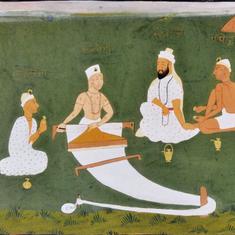In his first series away from home in 1976-'77, in Australia, the fashion amongst senior players was to carry smart leather briefcases with them. Inside, usually, were documents indicating their flourishing status; county contracts, travel papers, sponsorship deals. Impressed, young Miandad soon acquired himself a briefcase, strutting around with it everywhere. He had, however, nothing to carry in it.
An equally junior teammate, puzzled, asked him: “Javed, what are you doing with a briefcase? You don’t have any contract, or sponsorship!”
“See here, I have a copy of the Quran in it,” Miandad replied. “And doesn’t it look good?”
There are countless Miandad tales, but this one feels particularly revealing: that need, faintly obsessive, to be loved and respected, and to impress and be considered equal. But at the same time, there is a belief, as natural as childbirth that he is good enough to belong in the very highest company. Asked whether he was at all overawed when first selected for Pakistan – back in 1975 for the World Cup – to walk into a dressing room of such stars, he was bemused. “Why would I be overawed?”
An act of genius
Then, in early 1993, he leaves a scene on the mind, a scene that is difficult to forget. We are in Hamilton and Pakistan, under Miandad’s leadership, are soon to pull off a memorable triumph, one that beautifully captures the spirit of a side capable of conceiving victory from thin air.
New Zealand are just recovering from early jitters in chasing a measly 127 for victory in a one-off Test. They are 61 for 3 and Andrew Jones and Adam Parore have put on 29 difficult and necessary runs. Waqar Younis is building up some pace and finding some late, inward curve with the old ball. Jones manages to dig one such yorker from outside off, the ball squirting off an inside edge to square leg where Miandad is stationed. No run is on, but Jones takes a couple of steps out as a matter of course; the non-striker Parore, out of reflex or courtesy perhaps, responds with a couple of his own.
Miandad picks up the ball and shapes his body to throw at the non-striker’s end, forcing Parore to scamper back not unlike a common burglar on meeting a flashlight. Without changing direction though, without so much as a glance to locate his bearings, Miandad instead hurls the ball at the striker’s end. Everyone is caught pants down, hands in cookie jars.
Wicketkeeper Rashid Latif is not even close to collecting the throw as post-delivery decorum requires. Even the cameraman square on the boundary on the off side is momentarily caught off-guard, panning instinctively to the non-striker’s, before jerking back to Jones’s end. The throw misses the stumps by centimetres. Jones doesn’t catch on till very late, a man unaware that he is dodging a bullet first, but hurrying his bat down later.
An attempted no-look direct-hit run-out; it is an act of genius, dimmed none by the fact that he misses.
It is Miandad more than any innings or shot: ever alive to opportunity, always ahead of the game, prodigiously gifted and with an instinct sharpened by a permanent sense of desperation which produces just the right response to any situation.
Honour, respect, repute
…At the centre of Miandad is the quest for izzat, an amalgamation of honour, respect and repute. It is a central plank on which the subcontinent and Islamic world operate, more so than in many parts of the world. In Pakistan, izzat crops up everywhere, like those casual bystanders who emerge at a road accident or street-side scrap, in almost any debate, in any public conversation.
The entire afternoon with Miandad is heavy with this theme; he uses the word itself over twenty times, mostly when you least expect it.
For example, Pakistan’s win in Bangalore in 1987, a fabled Test which sealed Pakistan’s first series win in India. Miandad scored no great runs through the series, but one contribution was vital. He is widely considered the tactical spur of Imran Khan’s sides, the man who gave detail to Imran’s broad principles. From him would come a tweak in the field here, a bowling change there, a selection gambit. In Bangalore, as deputy to Imran he convinced him to pick left-arm spinner Iqbal Qasim ahead of the leggie Abdul Qadir.
The latter had been easily repelled over four Tests but he was Imran’s blue-eyed boy. Eventually Imran relented; those who know Miandad know well that the trick is not to get him to talk, but to get him to stop talking. Qasim played, took nine wickets and won the game.
Having told the story, Miandad takes a sudden detour. “I never paid any attention to all this because I used to believe you do stuff on the ground and that is it. Once you stop doing it nobody will ask about you. This is my imaan (faith), that when Allah gives you izzat, it means you have done good things. And if any guy has respect, then it is your farz (duty) to give him respect also, because that is like giving Allah izzat. Who has given me izzat? Allah. So if you doubt me, you doubt Allah.”
A matter of belief
For a certain kind of believer, the circular logic is difficult to break. It is the way with Miandad, especially when he uses his favourite bit of logic in any cricket argument: who else, he often asks, could know more than him about cricket here, for who else has played as many Tests as he has for Pakistan? It is precisely the kind of logic that sounds better coming from someone else even if it may be true and it is precisely this kind of logic, unfortunately for him, that has led to his various fallouts, as player, captain, coach and administrator, with other players, captains, coaches and administrators.
Still, he wants to make sure that izzat is understood, and excited with his own reasoning, he continues, insisting the following is quoted. “When you make someone a Lord or Sir in Western countries, everyone respects them. Here, every Muslim name has been given respect. If you say Lord or Sir, why do you say it, why do you respect? Whoever has been put on that level has been done so here by Allah, even if he is poor. Allah has given him respect and so it is our duty to respect. How can we be successful if we cannot give respect to others?”
“This,” he concludes, “is my belief.”
Excerpted with permission from The Unquiet Ones: A History of Pakistan Cricket, by Osman Samiuddin, Harper-Collins India.










